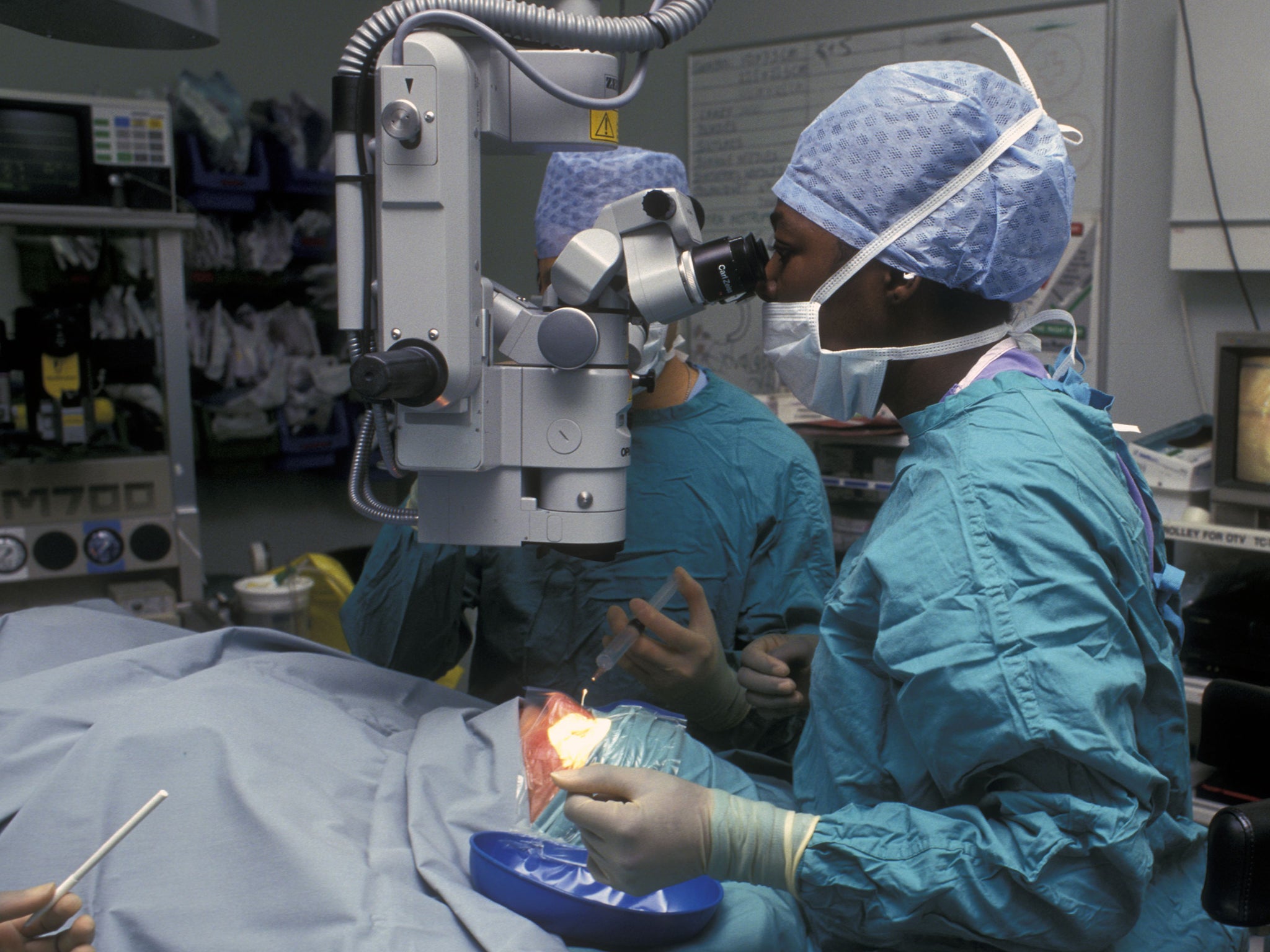NHS private sector plan risks safety and ‘poaches’ staff, doctors warn
Exclusive: NHS services could ‘collapse’ amid plans to contract more to private hospitals, doctors warn

Healthcare leaders have been warned by nearly 200 doctors that plans to give more work to private hospitals will “drain” money and staff away from NHS services, leaving the most ill patients at risk.
In a letter seen by The Independent, almost 200 ophthalmologists urged NHS leaders to rethink plans to contract cataract services to private sector hospitals, as to do so “drains money away from patient care into private pockets as well as poaching staff trained in the NHS”.
The doctors have called for “urgent action” to stop a new contract from being released, which would allow private sector hospitals to take over more cataract services.
They raised concerns that NHS ophthalmology services would fall into the same crisis as NHS dentistry, which they say would have “blinding consequences” for patients.
One of the authors of the letter told The Independent the plans would mean there would not be enough NHS staff available to carry out more complex surgeries, where patients are at risk of losing their eyesight.
The news comes as the government and NHS England published plans on Tuesday to reduce NHS waiting lists, which included offering more patients treatment within private hospitals.
The letter was sent on Sunday to NHS England and the Royal College of Ophthalmologists and was signed by 194 doctors within 24 hours.
It said: “We wish to raise our concerns about the accelerating shift towards independent sector provision of cataract surgery and highlight the destabilising impact that this is already having on safe ophthalmology provision as a perhaps unanticipated consequence.”
It continued: “Urgent action is required to prevent the collapse and privatisation of NHS ophthalmology. The NHS is not perfect and can always be improved. It relies on a lot of good will and a spirit of working for the common good. This is being rapidly eroded by current policies on outsourcing care at a time when we should instead be investing in NHS ophthalmology to support its new, efficient care models.”
Doctors warned the effects of the plan would be “destabilising” for NHS-run services, and that using private providers would “drain money away from patient care into private pockets as well as poaching staff trained in the NHS.” It said: “They fuel wage inflation and create conflicts of interest for existing consultants, stifling NHS hospital service development.”
Speaking with The Independent, Professor Ben Burton, consultant ophthalmologist and one of the lead signatories of the letter, said: “What’s happening is that staff who could be treating preventable but irreversible sight-threatening conditions like glaucoma, macular degeneration, and diabetic retinopathy are instead doing cataract surgery for private providers.
“Staff who would normally be working, perhaps doing overtime, additional clinics and additional lists for the NHS, are now doing them for the private providers instead, where they’re getting paid a lot more.”
Professor Burton said there were areas in the country where NHS clinical commissioning groups were “unexpectedly” billed around £3m for cataract surgery, and that they do not have any control over this expense.
He pointed out that moving cataract surgery to the private sector means it is more difficult for the NHS to train junior doctors, who would usually be doing these procedures.
Ophthalmology accounts for around 10 per cent of the NHS waiting list backlog, according to the Royal College of Opthalmologists, who said on Tuesday there were 600,000 patients waiting for eye procedures and “many more” waiting for a diagnosis before treatment could start.
In November last year, the Royal College warned that private providers were “playing a major role in the delivery of NHS ophthalmology services in England, especially cataract surgery where they are undertaking almost half of NHS-funded procedures.”
The college said that, although this had helped to increase capacity, it had also led to difficulties for the NHS in maintaining a well-trained workforce and sustainable ophthalmology services.
Professor Burton acknowledged that Covid had made waiting lists far worse, on top of an existing long-term worsening capacity problem. But he said: “What is needed is a long-term sustainable solution rather than a knee-jerk reaction which risks the future of ophthalmology as an NHS service.
“The long-term solution will be achieved by investing in NHS providers to deliver modern, efficient care, and the private sector only used as a last resort.”
A spokesperson for NHS England said: “NHS staff have done an incredible job over the last year recovering elective treatment levels, but it is important as we look to tackle the Covid backlog that we use every possible tool available to the health service to treat patients. This includes using the independent sector, where needed.”
Join our commenting forum
Join thought-provoking conversations, follow other Independent readers and see their replies
Comments

Bookmark popover
Removed from bookmarks